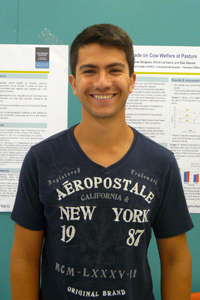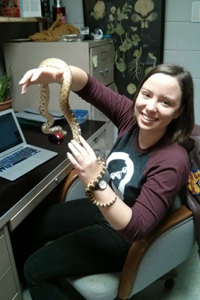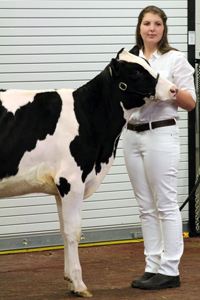Organic Science Cluster II Students
These young minds are participating in research activities underway as part of Organic Science Cluster II as graduate students.
Quail Das
|
Activity D.46: Fruit pomaces to improve immunity and health of organic chickens |
I feel very privileged to be a part of the Organic Cluster project and working at the Guelph Food Research Center (GFRC) under the supervision of Dr. Moussa Diarra.Ā Dr. Keith Warriner and Dr. Massimo Marcone, from the University of Guelph, are also supervising me. We propose to use berry-pomace feed supplementation to reduce the incidence of pathogenic bacteria and the development of antimicrobial resistance in animal production. The overall objective is to exploit the berry pomace phytochemicals' immuno-stimulating properties against major foodborne pathogens, thereby increasing host-defenses against target bacteria. To do so, we will identify, recover, quantify and chemically-characterize bioactive compounds in berry pomaces. We are trying to explore the possible mode of action of these phytochemicals against resistance and virulence genes of bacteria. Pomaces that show the best in-vitro results will be provided to chickens during critical growing periods (1 to 14 day of age where they are vulnerable to infections) to increase their immune response. Next, the in-vivo evaluation of the effect of pomace and fractions diets on the evolution of bacterial communities in the ceca and cloacae will be performed to evaluate effect of pomace on bacterial community, structure and composition and also on their immunological profile. |
Sierra Harris |
Activity C.37: New innovative weed management for organic crops |
I am originally from Sudbury, Ontario, but moved to Guelph to complete my Bachelors of Science at the University of Guelph and am now working towards finishing my masterās degree. For my thesis, I am examining the efficacy of manuka oil as a tank mix option for organic vegetable farmers. I am excited to be involved in this research because it focuses on the organic sector of the agriculture industry, which is historically underrepresented in scientific literature. I strongly believe in the core principles of organic agriculture and have personally witnessed how they can improve a community, soil health and crop resilience to abiotic and biotic stresses. I think it is important to scientifically document these benefits to further support future organic farmers. In the future, I see myself starting my own organic CSA to share my knowledge and wholesome produce with the local community. |
Santiago Palacio |
Activity D.43: Effect of exercise and stall modifications on cow comfort and performance in tie-stall farms |
My main interest in organic is rooted in a concern for animals and their well being, something that tends to go hand in hand with the organic industry. In addition, I feel that the organic way of production is more easily sustainable and something that should be researched for alternative methods of production as the organic industry has greatly grown recently. My involvement in the project is to lead the data collection process, as well as perform data analysis once all data has been collected. The main focus of the project is to see how cow comfort and welfare is affected when changes to the tie-stalls are made and how cows with access to pasture and/or winter exercise react to said changes compared to conventionally kept cows (no pasture or exercise). |
Corrina Thomsen |
Activity B.12: Microbial management in organic viticulture: Pre-inoculating vines with arbuscular mycorrhizal fungal inoculants |
Curr I am currently working on my MSc with Miranda Hart and John Klironomos at the University of British Columbia Okanagan, and completed my BSc at Queenās University with a thesis in evolutionary ecology. I have decided to focus on this research topic because of food security issues and the need to produce more food with fewer inputs, which I feel AMF could help address.Ā |
Kristen Wight |
Activity D.45: Bioactive products from plants and control of internal and external parasites in large ruminants
|
Kristenās research focuses on feeding birdsfoot trefoil to dairy heifers, in order to combat gastrointestinal nematodes (GIN) infections in a natural way. Previous research has shown that birdsfoot trefoil could prevent GIN infection in grazing heifers, but its effect on highly infected heifers has not been determined. Kristen will also be looking at preference testing to observe if heifers choose birdsfoot trefoil when their GIN numbers are higher, for self-treatment. Birdsfoot trefoil may be a promising alternative to the widespread use of anthelmintic drugs to control GIN infections in cattle. Kristen will be working with the dairy herd at Ridgetown Campus, under the supervision of Drs. RenĆ©e Bergeron and Simon Lachance. |

 I am Quail Das, pursuing my PhD from the Food Science Department at the University of Guelph. I was born in Bangladesh and did my BSc in microbiology. I did my Masters in Environmental Science and Technology from the Asian Institute of Technology, Thailand. As part of my masterās project, I worked on quantum dots for the improvement of conventional FISH technique for the identification of microorganisms and for its efficient application in water. After moving to Canada with my spouse, I did my second masters in Food Safety and Quality Assurance (FSQA), exploring issues of food safety and how different practices in animal production have created a threat for human society and the environment as well. For my FSQA project, I worked on berry juices to explore the antimicrobial activities of different phytochemicals naturally present in fruit juices that inhibit the growth of several foodborne pathogens, such as Salmonella. My research has inspired me to investigate more on the nutritional benefits of berry, particularly berry pomaces which would be cost effective, promote the health of animals (poultry) and prevent infection in organic farms. The research earned me a reviewed publication in the journal of Food Control. This pilipiliĀž» inspired me to work on more challenging molecular work on microbial communities influenced by feed additives.
I am Quail Das, pursuing my PhD from the Food Science Department at the University of Guelph. I was born in Bangladesh and did my BSc in microbiology. I did my Masters in Environmental Science and Technology from the Asian Institute of Technology, Thailand. As part of my masterās project, I worked on quantum dots for the improvement of conventional FISH technique for the identification of microorganisms and for its efficient application in water. After moving to Canada with my spouse, I did my second masters in Food Safety and Quality Assurance (FSQA), exploring issues of food safety and how different practices in animal production have created a threat for human society and the environment as well. For my FSQA project, I worked on berry juices to explore the antimicrobial activities of different phytochemicals naturally present in fruit juices that inhibit the growth of several foodborne pathogens, such as Salmonella. My research has inspired me to investigate more on the nutritional benefits of berry, particularly berry pomaces which would be cost effective, promote the health of animals (poultry) and prevent infection in organic farms. The research earned me a reviewed publication in the journal of Food Control. This pilipiliĀž» inspired me to work on more challenging molecular work on microbial communities influenced by feed additives. I would like to introduce myself; I am Sierra Harris, a Masters candidate in the Department of Plant Agriculture at the University of Guleph and my advisor is Dr. Rene Van Acker.
I would like to introduce myself; I am Sierra Harris, a Masters candidate in the Department of Plant Agriculture at the University of Guleph and my advisor is Dr. Rene Van Acker. I am Santiago Palacio. I was born in Colombia, briefly lived in Florida and has lived in Canada since 2003. I completed my undergraduate degree in biology and psychology in 2011 at the University of Ottawa, and then completed my Master's in Animal Science, focused on animal behaviour and welfare at the University of Guelph.
I am Santiago Palacio. I was born in Colombia, briefly lived in Florida and has lived in Canada since 2003. I completed my undergraduate degree in biology and psychology in 2011 at the University of Ottawa, and then completed my Master's in Animal Science, focused on animal behaviour and welfare at the University of Guelph. ently, my project focuses primarily on Activity B.12 of OSCII - does pre- or co-inoculation of vines with arbuscular mycorrhizal fungi (AMF) improve establishment pilipiliĀž»? I will also be expanding on that to examine the overall establishment pilipiliĀž», inoculant persistence, and effects on the native fungal community, which will help growers understand the conditions that effect establishment and how frequently systems would need to be inoculated. It will also help understand potential problems with using AMF inoculants, which is important in developing sustainable practices.
ently, my project focuses primarily on Activity B.12 of OSCII - does pre- or co-inoculation of vines with arbuscular mycorrhizal fungi (AMF) improve establishment pilipiliĀž»? I will also be expanding on that to examine the overall establishment pilipiliĀž», inoculant persistence, and effects on the native fungal community, which will help growers understand the conditions that effect establishment and how frequently systems would need to be inoculated. It will also help understand potential problems with using AMF inoculants, which is important in developing sustainable practices. Kristen started her MSc by thesis program in September 2016. She grew up on a horse farm and completed a BSc in Animal Biology at the University of Guelph. Kristenās interest in dairy health began during her co-op placement in high school and flourished throughout her undergraduate program. She jumped two feet into every dairy class offered, and put her hand to showing and handling heifers at College Royal. Wanting to further her knowledge of dairy health, management and welfare encouraged Kristen to pursue graduate studies.
Kristen started her MSc by thesis program in September 2016. She grew up on a horse farm and completed a BSc in Animal Biology at the University of Guelph. Kristenās interest in dairy health began during her co-op placement in high school and flourished throughout her undergraduate program. She jumped two feet into every dairy class offered, and put her hand to showing and handling heifers at College Royal. Wanting to further her knowledge of dairy health, management and welfare encouraged Kristen to pursue graduate studies.